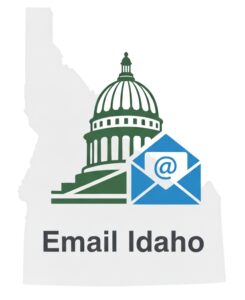Why EmailIdaho.com Beats “Mailto” Links Every Time
If you’re trying to reach Idaho legislators, you want your message to get there fast, look professional, and actually show up where they’ll see it. That’s exactly what EmailIdaho.com does, and it’s why our system runs circles around some random “mailto” link that dumps a bunch of addresses into your personal email program.
Deliverability That Actually Delivers
We run on dedicated SMTP servers with SPF, DKIM, and DMARC locked in so your message has the best shot at avoiding spam filters. Even then, the State of Idaho has a nasty habit of shoving messages into legislators’ “gray mail” folders. We’re constantly updating our system to beat that filtering game so your email gets where it’s supposed to go.
Consistent, Professional Formatting
Every email through our system is clean, readable, and uniform — no weird fonts, missing recipients, or half-broken layouts. You send it once, it goes out right. With a “mailto” link, you’re rolling the dice on how your personal setup handles it.
High-Volume Capability Without the Gotchas
Yes, Gmail can send up to 500 recipients a day (2,000 for paid accounts) and ProtonMail can do about 150 (depending on the package level), but that includes every email you send — not just your blast to the Legislature. Big recipient lists can get chopped without warning, and blasting the same message from a personal account is a fast way to tank your sender reputation so more of your email ends up in spam.
ProtonMail’s built for privacy, not outreach. Most providers will throttle your messages to protect their network. Our servers are built for one thing — getting bulk messages through. No daily caps, no silent drops, no throttling.
One Click, Right Audience
Want to hit the full Legislature? Just the House? A specific committee? With EmailIdaho.com, it’s one click. No manual list building, no guessing if you grabbed everyone.
Why We Log IP Addresses (and Why It’s Not a Problem)
People often misunderstand IP address collection because they assume it is the same as collecting their full identity or physical location. In reality, an IP address is usually just the network’s “return address” for routing data on the internet. While it can sometimes be linked to a general geographic area, it does not automatically reveal a person’s name, home address, or browsing history. Connecting an IP to an individual typically requires cooperation from an internet service provider and a legal process. The confusion comes from mixing technical reality with what people see in crime shows or news reports, where IP tracking is portrayed as instant, precise, and deeply personal.
We log IPs for three reasons:
-
- Stop spam, bots, and abuse.
- If someone threatens a legislator, we can give law enforcement a place to start. Tracing it to a person still takes legal process and ISP cooperation.
- Fix tech issues so your messages keep going through.
What we don’t do:
-
- Sell your IP data.
- Track your browsing.
- Share it without a legal requirement.
